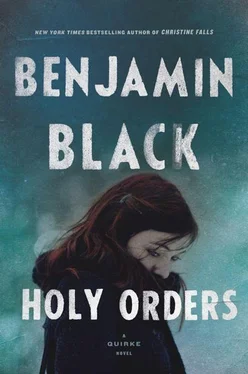A single tear slid down swiftly from her left eye and ran in at the corner of her mouth. She seemed not to notice it.
“Did he — did he have a girlfriend?” Quirke asked.
Phoebe looked up quickly. She had caught something, a question behind the question. “He was very fond of April Latimer,” she said carefully, seeming to select the words and lay them out before him on the table, like playing cards. April Latimer had been a friend of Phoebe’s who had disappeared, who perhaps had been killed, as now Jimmy had been. Her mind shied away from the horror of it all. “I sometimes thought they might…” Her voice trailed off.
“But — they didn’t?”
“No.”
She shivered. Quirke reached a hand across the table but stopped short of touching her. “Are you all right?” he asked.
“Yes,” she said. “No.” She shook her head. “I don’t know.” She gave him a look of desperate appeal. “Did he — would he have suffered, a lot?”
“No,” he said, making himself sound brisk and persuasive. “Not at all, I’d say. He was hit on the head — the blow would have knocked him unconscious.” He did not mention the terrible bruises on Jimmy’s chest and flanks, the gouged right eye, the mangled pulp at his crotch. “But whoever did it was either very angry with him or had been told to make a thorough job of it.”
Phoebe did her sad little laugh again. “Yes,” she said, “Jimmy had a way of getting under people’s skin. He saw it as his professional duty to annoy everyone. If there wasn’t somebody angry at him, he knew there must be something he was doing wrong.”
“But he didn’t mention anything, or anyone, in particular, the last time you saw him?”
She began to answer, then stopped, and gave him a sharp look, narrowing her eyes. “You’re playing at detectives again,” she said, “aren’t you. Yes, you are — I can hear you getting interested. Have you talked to your friend Inspector Hackett yet?”
“I’ll probably be seeing him before long,” Quirke said shortly, looking away.
“It’s supposed to be his job, not yours, you know,” she said, “catching people who do things like this.”
They were both thinking of the time, years before, when Quirke himself had been badly beaten up — he still had the trace of a limp. He had been playing at detectives then, too.
“I’m aware of that,” he said. “But you’d like to know, wouldn’t you, what happened to Jimmy?”
“Yes,” she said. “All the same, I’ll say it again — it’s not your job to find out.”
He beckoned to the waiter and ordered a glass of brandy for her. She began to protest. “It will do you good,” he said. “The shock hasn’t hit you yet.”
She did not fail to note that he had resisted ordering a brandy for himself; it was considerate of him, and she supposed she should appreciate the gesture.
They were silent while they waited for the drink to be brought. Both were aware of a constraint between them. Death the transgressor had no respect for the niceties of social occasions.
“You say his people live down the country,” he said, when the waiter had come and Phoebe was taking a first, wincing sip from her glass. “Any idea where?”
“They’ll know at the paper, surely.”
“Yes,” Quirke said. “They’re bound to.” Inspector Hackett, he reflected, was probably at this minute talking to Harry Clancy, the editor of the Clarion, who would be shaking his head in a show of dismay and shedding crocodile tears. Phoebe was right: Minor had done little to make himself liked by anyone, especially the people he worked for. “And you don’t know,” Quirke asked, “of any particular story he was following up?”
“No,” Phoebe said, “I don’t. In fact, I can’t remember when we last spoke.”
“And he had no girlfriend.”
Again Phoebe gave him a sharp look, hearing again that other, unspoken question behind her father’s words. “Are you asking me,” she said, “if he was — you know — that way?”
He gazed back at her expressionless. “Was he?”
“I don’t know,” she said. It was the truth. But what she did know was that there had always been something about Jimmy that had made him hold himself apart, a remoteness, a physical aloofness. She was certainly no vamp, but between her and most men there was always a hint of something, a sort of crackle in the air, like electricity; it was normal, it was the way things were between men and women. Jimmy, however, had generated no lightning.
When Quirke said nothing, Phoebe asked, “Do you think, if he was inclined that way, that it might have something to do with what happened to him? I mean, men who are like that sometimes get beaten up, don’t they, just for being what they are?”
“Yes,” Quirke said, “so they say.”
Phoebe looked at her hands, which were again clasped tightly in her lap. “It would be terrible,” she said quietly, “if something like that got dragged up. His family…”
“I don’t think you need worry on that score,” Quirke said. “Even if it’s true, the Clarion won’t print it, and nor will anyone else. Sometimes the kind of censorship the papers impose on themselves is a blessing.”
The waiter came and cleared their plates, and they sat silent again, both of them, looking into the street. How strange it was, Phoebe thought, to be here in this lavishly appointed room, with all this burnished cutlery and these sparkling white napkins and gleaming wine glasses, beside this window and this sunlit, busy street, while her friend was laid out dead in that chill, bare basement where her father worked all day long delving and probing into bodies just like Jimmy’s.
There were few aspects of a murder investigation that Inspector Hackett enjoyed, but what he disliked most was dealing with a victim’s relatives. It was not that he was unfeeling or did not have sympathy for these suffering parents, these brothers and sisters, sons and daughters — quite the opposite, in fact — only he never knew what he was supposed to say to them, what comfort he was supposed to offer. True, he was not required to console them. He was a professional, in the same way that a doctor was. Quirke, for instance, was not expected to hold a grieving mother’s hand, to put an arm around the shoulder of a dazed sibling, to pat the head of a weeping orphan. There was a lot to be said for being a pathologist, as he often reminded Quirke. Handling the dead was easy, or easy at least compared to coping with the living. Why did he always have to feel responsible? Why did he think he had to share, or to give the impression of sharing, in these people’s pain? But it was too late now to harden his heart, or harden his behavior, anyway.
He met the Minors in the lobby of the Holy Family Hospital. It was early afternoon. The Minors were well named, for they were, all three of them, short people. Not only short, but miniature, almost, like scaled-down models of themselves. The mother was a wisp of a thing, with hardly a pick on her, as Hackett’s own mother would have said. She wore old-fashioned spectacles with circular wire frames and thick lenses through which she peered about her frowningly, making constant, tiny movements of her head, nervous and birdlike. She seemed more preoccupied than grief-stricken, and kept sighing and vaguely murmuring in a distracted way. Her husband, a spry little fellow with rusty hair going gray, was the dead spit of his murdered son. He had an apologetic manner, and seemed to be embarrassed by the trouble his family was suddenly causing to so many people. Both parents referred to their son as James, not Jimmy. They spoke of him in tones of nostalgic fondness, as if he were not dead but had gone off to some distant country to make a new life for himself, far away from them but not entirely beyond reach.
Читать дальше












